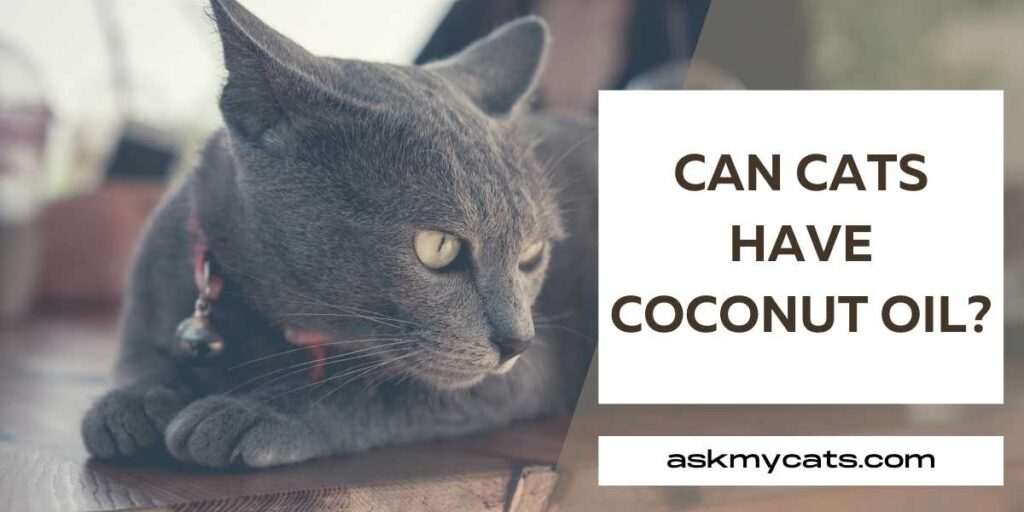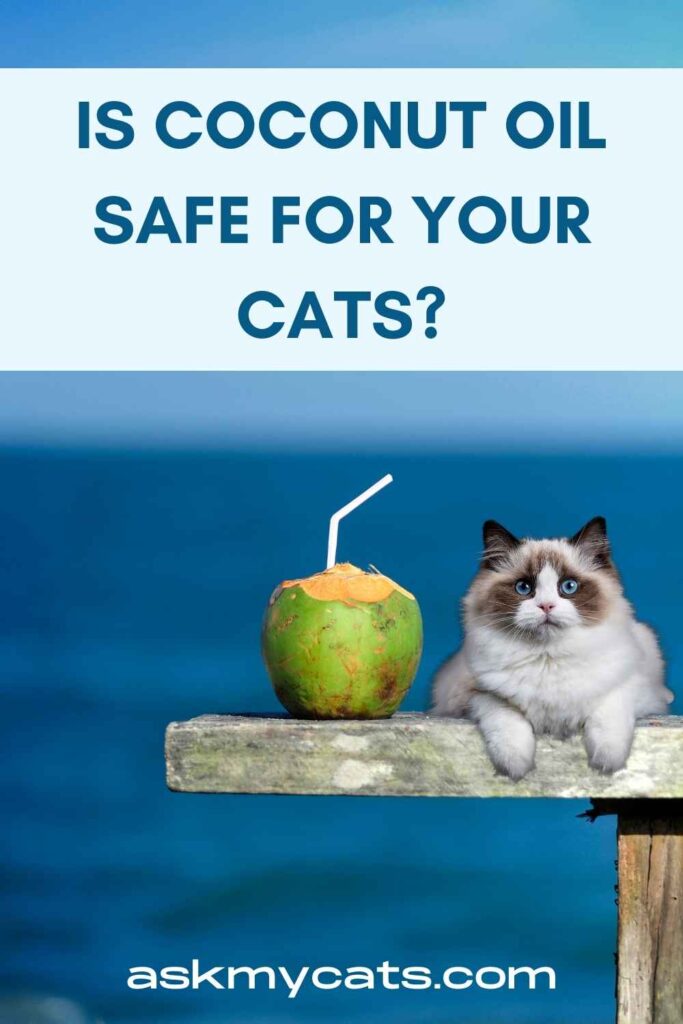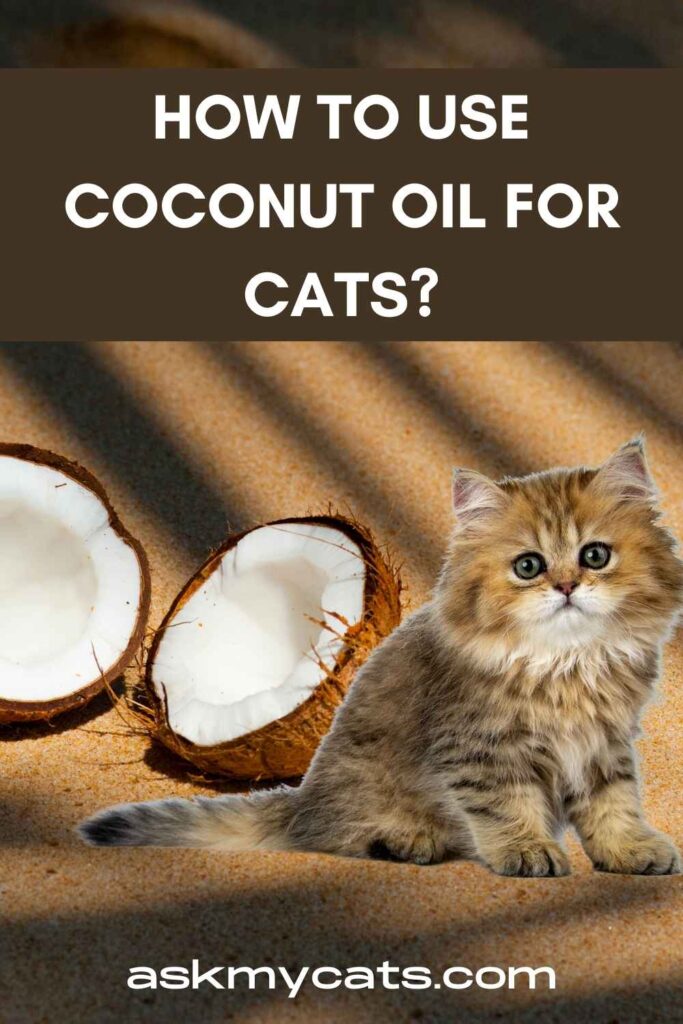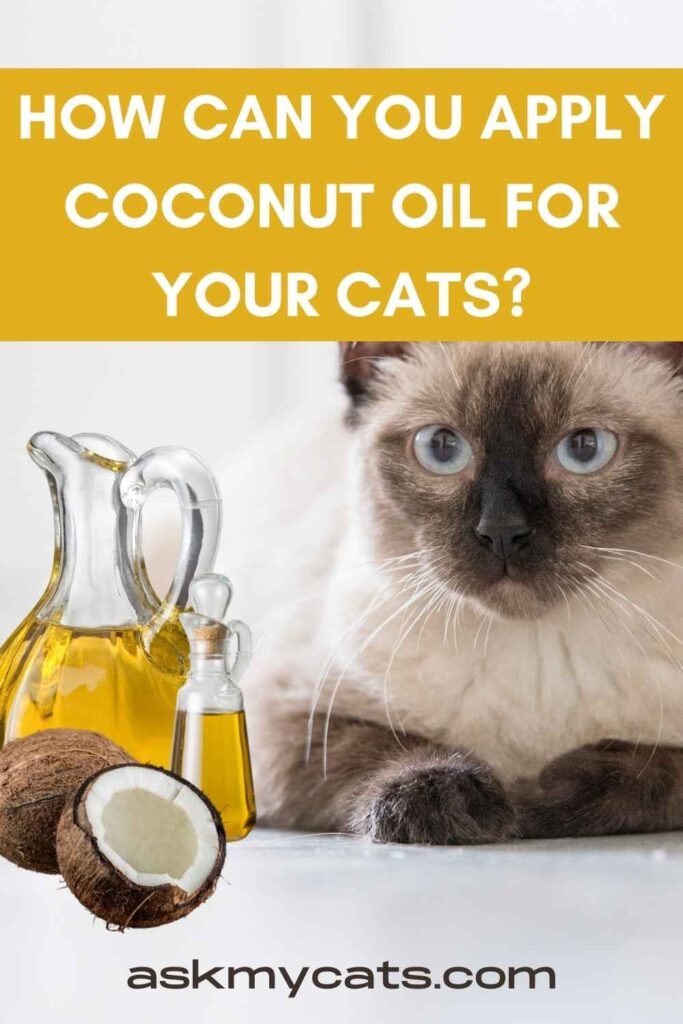Coconut oil has been used in cooking for decades, but its reputation as a holistic cure has soared in recent years. Coconut oil has several health advantages for humans, according to supporters.
In fact, it has grown in popularity to the point where some individuals are giving it to their cats in order to get the same advantages.
Therapeutic virgin coconut oil, as one of nature’s real “superfoods,” can help all types of dogs. Carnivores like dogs and cats are among them, as are tiny and big herbivores like hamsters, rabbits, goats, horses, and even parrots.
Is coconut oil really good for cats or bad for them? Before giving coconut oil to their cats, well-meaning cat owners should educate themselves on the subject.


Give Your Cat the Perfect Day
Get the Free Ebook!
What Exactly Is Coconut Oil?
I know, that sounds like a silly question. We all know and have used coconut oil before. But here, I am talking about the composition of coconut oil. It is time to get a little technical and scientific to know what exactly makes up this organic miracle liquid.
Coconut oil is extracted from mature coconuts and is suitable for use in both culinary and health items. It includes medium-chain triglycerides, which are saturated fatty acids (MCTs).
MCTs are more easily absorbed than long-chain triglycerides, including palm kernel oil and other such oils like olive oil, soybean oil, avocado oil, and fish oil.
As a result, MCTs are thought to be a superior source of rapid energy than long-chain triglycerides, and they are less likely to be converted to fat in the body.
MCTs may be made up of a variety of fatty acid chains, including caprylic acid and capric acid, both of which have been demonstrated in lab experiments to have antifungal characteristics.
They also have lauric acid in them, which has antifungal, antibacterial, and antiviral effects.
People are understandably eager about the possible health advantages of coconut oil, which contains caprylic, capric, and lauric acid.
Does Coconut Oil Really Have The Qualities That Make It A Wonder Liquid?
Even though there are numerous claims about the health advantages of coconut oil, it is crucial to note that these claims are not backed up by science. Studies on human beings have usually proven inconclusive.
This is not to argue that coconut oil is ineffective or hazardous; rather, it is to state that the effects of coconut oil have not been demonstrated in cats.
MCTs found in coconut oil and other foods have antibacterial, antifungal, antiviral, and anti-inflammatory activities. Some people believe that the MCTs in coconut oil might help with digestion, relieve digestive issues, and prevent hairballs in cats.
Another notion is that MCTs can aid elderly cats with brain energy and cognition.
Some cat owners believe that using coconut oil, either orally or topically, can enhance the quality of their cat’s coat and relieve dry, itchy skin. Further research suggests that it may help with metabolic functioning, weight loss, arthritic pain relief, and bone health.
It’s critical to note that these are unverified statements with no scientific backing.
You will like to check out Can Cats Eat Coconut? Is Coconut Safe For Cats?
Is Coconut Oil Safe For Your Cats?

With all these benefits of the “wonder liquid” that is coconut oil, you may be tempted to drench your cat in it right away.
But wait, have patience and read along to see how safe coconut oil really is for your cats and what is the right way of using it.
With all of the possible advantages outlined, coconut oil appears to be the newest wonder cure-all. You may already be utilizing it and reaping the advantages.
If you think coconut oil may be beneficial to your cat, you should first seek advice from your veterinarian.
Although coconut oil is not toxic to cats, it may not be the best choice for every cat’s diet. Any changes to your cat’s food, supplements, or medications might have an impact on his or her health.
Increased fat in your cat’s diet may result in weight gain or digestive difficulties. Your veterinarian is familiar with your cat’s medical history and physical health and can advise you on the best course of action.
Know What Most Veterinarians Have To Say About Coconut Oil For Cats
In general, veterinarians do not normally encourage the usage of coconut oil. This is mostly due to the fact that the putative advantages indicated above are reported by owners rather than supported by research.
Coconut oil’s safety and efficacy must be established in a controlled setting with a large testing population that is reproducible and peer-reviewed.
Research on a limited number of cats published in 1985 discovered that the cats will shun diets containing even modest amounts of MCTs, suggesting that they are unappealing to cats.
So, while your friendly neighborhood pet supply store clerk may swear by a coconut oil treatment that worked for their cat, there’s no way of knowing whether or not it will work for yours.
Even vets are divided in their opinions on whether or not to give cats coconut oil. Here’s what two vets have to say about it:
Dr. Anna Gardner, a holistic veterinarian in Washington, adds that using coconut oil for cats has several benefits. Gardner claims that using coconut oil on the coat can aid with allergies, dry skin, itching, and general coat health.
Internally, she claims that coconut oil can enhance a cat’s immune system, help with hairballs, reduce arthritic inflammation, relieve poor breath, and promote digestive health.
On the other hand, Dr. Jeffrey Stupine, VMD, the Pennsylvania SPCA’s head veterinarian for wellness, would not suggest providing coconut oil on a daily basis, although his colleagues have seen it help with dermatitis.
All said and done, the easiest way for you to know whether or not to add coconut oil to the lifestyle of your cat will be to pick up the phone and dial your vet.
Check out Can Cats Drink Coconut Water? Is It Safe For Them?
How To Use Coconut Oil For Cats?

If coconut oil isn’t all that it’s made up to be, how exactly do you use it on your cat? First and foremost, do not put coconut oil on your cat until you have spoken with your veterinarian, who will be able to advise you which uses and amounts are suitable.
Vets usually suggest mixing modest quantities of coconut oil into food or applying it directly to cats with skin issues. But, like with any new meal or supplement, don’t overdo it with coconut oil.
Topical treatment for skin problems may appear to be safe and simple to administer. However, your cat will almost certainly lick the oil off once it has been administered.
This indicates that the oil is ingested by the cat and may irritate the skin in that region. You can use an over-the-counter shampoo containing organic coconut oil (although most cats do not enjoy a complete bath), but make sure it is designed for use on cats.
If your veterinarian allows, oral administration may be an alternative. Make sure you follow your veterinarian’s recommendations for dosage, frequency, and formula.
They will be able to advise you on the right amount so that you don’t mistakenly administer too much at once and wind up with a greasy, diarrhea-filled mess on your hands.
They may also advise you on the dangers and advantages of giving your cat coconut oil orally if he or she is prone to gaining weight or has a history of pancreatitis, irritable bowel syndrome, or any other illness or metabolic condition.
How Much Coconut Oil Can You Use For Your Cats?
You should introduce coconut oil gradually so that it is well accepted and does not produce an allergic response. Also, if taken too rapidly into the diet, it might produce diarrhea, which we know you don’t want. Start with 1/4 to 1/2 teaspoon once a day for an average-sized cat.
Use simply an extra 1/8 teaspoon of coconut oil each day while starting your coconut routine. If you use coconut oil to prevent hairballs, you only need to use it once or twice a week. In general, keep an eye on your cat and modify the dosage as necessary.
What Type Of Coconut Oil Can You Use For Your Cat?
For those of you who are unaware of this, yes coconut oil has several different types. There are four primary varieties that you should become acquainted with and understand the differences in terms of how they are created, processed, and what they are used for.
Organic Coconut Oil Versus Inorganic Coconut Oil
Simply defined, the distinction is between coconuts cultivated with pesticides and those grown organically without the use of chemicals.
In general, “coconut production” is more often than not a “sustainable production” rather than an “organic production,” in that coconuts don’t require many pesticides or herbicides to grow organically, and they’re frequently hand-picked rather than machine farmed, so the total environmental effect is low.
There is a lot of organically farmed coconut oil available on the market that should originate from “certified organic” sources. The problem is that many items claim to be “organically cultivated,” but lack the certification to back up the claim.
Also, because organic farming is not required to follow “eco-farming techniques,” organically grown coconut oil can originate from vast industrially operated organic farms that squander resources like water and utilize non-renewable energy sources that harm local eco-systems.
The finest supply of coconut oil is from farmers that cultivate “sustainably” and “organically.”
Extra Virgin Coconut Oil Versus Virgin Coconut Oil
Extra Virgin Coconut Oil does not exist as an extraction method; you may get “virgin coconut oil” but not “extra-virgin coconut oil.”
The distinction between extra virgin and virgin is a holdover from the Olive Oil era when the goal of commercializing coconut oil was to distinguish higher-quality oils from lower-quality oils. Because virgin oils are more natural and purer.
If you see a jar branded “Extra Virgin Coconut Oil” these days, know that you’re paying a lot more money only for the companies to put the word “extra” on the label.
The most crucial aspect of coconut oil is determining whether it is “refined” or “unrefined.”
Refined Coconut Oil Versus Unrefined Coconut Oil
This is perhaps the most significant aspect of coconut oil or any oil for that matter. Refined oil is often of low quality and has few nutrients.
Refined oil is of poor quality oil since it has been bleached or heated to a high temperature and mechanically removed. It’s basically squeezing every last drop out of whatever is left over after the virgin extractions.
In most cases, it is made from copra rather than the flesh and fluids within and has had unpleasant flavors and odors eliminated, which is why it is flavorless and has no natural fragrance. Because it is brown when it is originally manufactured, it must be chemically bleached before it can be sold.
When you buy refined coconut oil, you lose all of the advantages of coconut oil and are more likely to acquire refined coconut oil that has been “refined” using chemicals. In our perspective, the only thing it would be useful for is cooking, but we wouldn’t even use it for that.
Refined coconut oil offers extremely few, if any, of the advantages of natural coconut oil since it contains almost no antioxidants or vitamins.
Refined coconut oil is not good for you or your pet’s health and should never be used topically or given to them.
You should always put coconut oil on your pet that is as near to its original condition as possible, such as raw or virgin. Avoid using “refined coconut oil” at all costs. It has no health benefits for your pet and may even be hazardous and potentially toxic.
Also read Can Cats Drink Coconut Milk? Know Before Feeding Them!
How Can You Apply Coconut Oil For Your Cats?

While we have covered a lot of helpful information regarding coconut oil and its use on cats, we have left one important question unanswered: how can you actually use coconut oil for your cats?
Don’t fret, as we are going to answer that question right now. Here is a list of 10 possible ways in which you can use coconut oil for your cats:
1 – Natural Conditioner
Pour a tiny quantity of coconut oil into your hands and massage it into your cat’s fur, depending on its size.
It functions as a natural conditioner, decreases odor, and aids in flea prevention. Depending on your setting, you should strive to do this monthly or bimonthly.
2 – Natural Anti-Inflammatory
You can feed it to your cats. Because raw coconut oil is a fantastic natural anti-inflammatory, it can help your pet with conditions like arthritis, rehabilitation after surgery, and even losing or gaining weight in both cats and dogs.
Again remember: consult your vet before you decide to orally administer coconut oil to your cats.
3 – Removing Ear Mites
Coconut oil aids in the removal of ear mites in your pet. To help clean up mites or infections, simply wipe a tiny quantity along the outer line of the ear and put a small amount into the ear. Do this on a daily basis until the mites are gone.
4 – Anti-Fungal and Anti-Bacterial
Because coconut oil is anti-fungal and anti-bacterial, it may be used topically on bites or tiny cuts to help relieve irritation and inflammation.
5 – Moisturizer For Foot Pads
Apply a tiny quantity to your pet’s foot pads to help maintain them smooth and in good shape. Dry pads on your pet’s feet can be highly unpleasant and, if broken, can lead to infection or leave your pet lame. Apply the oil at night to let it absorb. If your pet licks it, don’t worry about it.
6 – Moisturizer For Nose
Apply a tiny quantity of raw coconut oil straight on your pet’s nose to help prevent cracking and weather damage in all seasons. Apply at night to avoid your pet’s adorable small nose from being burned by the sun.
7 – Remedy For Skin Problems
If your cat or dog has skin problems like itching, dry skin, or other allergies, use this product on them. It’s also fantastic to use if your pet scratches a lot because it relieves tension and anxiety caused by scratching.
You may massage a little coating of coconut oil into your pet’s fur and skin, apply it directly to the most sensitive regions, or comb through their fur with a small bit of oil on their grooming brush or comb.
We’ve discovered that gently combing it through the fur in the wrong direction first (very lightly if your pet has scabs) and then combing the fur the right way is one of the finest methods to apply it. This helps the oil to permeate the skin and hair follicles deeper. You can do this every day until the itching stops.
8 – Oral Hygiene
If you are not giving your cat raw bones, which are vital for maintaining your pet’s oral hygiene, one option to help them have healthy teeth is to combine a little bit of raw coconut oil with a small amount of baking soda to produce a natural non-toxic toothpaste to clean their teeth.
You’ll probably have more luck cleaning your dog’s teeth than your cats’, but it’s important to maintain your pet’s dental hygiene to prevent infection, plaque, and bad breath.
9 – Preventing and Minimizing Shedding
If you give it to your cat or apply it straight to his coat, it can help enhance his fur and minimize shedding, making your cat less prone to coughing up hairballs. It may be put into your cat’s food or given straight to him.
10 – Gut Health
Raw coconut oil’s high lauric acid content can assist your cat or dog’s gut to destroy parasites and dangerous bacteria, as well as decrease inflammation in the gut and digestive tract.
Because of its rich Medium Chain Triglycerides, it can also aid your pet if they have liver or pancreatic illness.
These saturated fats do not need to be digested by the pancreas or gallbladder and are simply turned into energy by the liver.
Directly interact with your veterinarian to verify that you’re delivering the right amounts to your sick pet and that it’s being monitored.
What Are The Benefits Of Coconut Oil For Cats?
1 – Coconut oil for coat
Coconut oil may be used topically and orally to maintain your cat’s coat lustrous and healthy, as well as to avoid the development of dry, irritated skin. It kills parasites such as mange, fleas, and ticks by suffocating them with the oil’s fat content.
Furthermore, because coconut oil is anti-microbial and anti-inflammatory, it prevents parasite bites from becoming infected and aids in the healing of irritated skin.
Coconut oil also works well as a moisturizer for flaky, dry skin. Its antioxidant effects help soothe and cure damaged skin, while its high lauric acid concentration provides antibacterial, antiviral, and antifungal capabilities.
As a result, coconut oil is excellent for treating a variety of diseases caused by viruses and bacteria both within and outside the body.
2 – Coconut oil for hairballs
Because coconut oil enhances your cat’s coat, shedding is minimized, and your cat is less likely to get hairballs in his or her stomach.
When your cat regurgitates hairballs, coconut oil can help to relieve irritation in the respiratory tract. It also aids digestion and provides moisture to the stool, making hairballs easier to pass.
3 – Coconut oil for digestion
Coconut oil’s medium-chain fatty acids (MCFAs) reduce unnecessary strain on your cat’s digestive tract. They are easily digested in the intestines and aid the body’s absorption of minerals and vitamins from the diet.
Coconut oil contains anti-microbial lauric acid, which destroys parasites, fungus, and dangerous bacteria in your cat’s intestines.
Coconut oil also has natural anti-inflammatory, anti-bacterial, anti-viral, and anti-fungal qualities that promote digestive health, aid in the healing of digestive system injuries, and help avoid chronic inflammation.
4 – Coconut oil for inflammation
Coconut oil helps more than only soothe inflammation in your cat’s digestive tract. The oil’s lauric acid contains anti-inflammatory qualities that help reduce inflammation throughout the body.
Cats grow increasingly prone to inflammatory diseases as they age. Arthritis and painful swelling joints are more prevalent in senior cats.
Coconut oil relieves inflammatory symptoms, enhancing mobility and energy levels in your cat.
5 – Coconut oil for boosting the immune system
The immune-boosting properties of coconut oil protect your cat from viral and bacterial infections and reduce the likelihood of allergic reactions and other common ailments.
Coconut oil’s lauric acid concentration has anti-fungal, anti-bacterial, anti-viral, and anti-yeast characteristics that can immediately alleviate allergic responses. It also strengthens the immune system, assisting your cat in fighting infection and sickness.
What Are The Risks Involved In Using Coconut Oil For Cats?
While coconut oil has certain advantages for cats, it’s crucial to remember that it’s on the ASPCA’s list of “People Foods to Avoid Feeding Your Pets,” which states that while it generally won’t do much harm, it may induce upset stomachs or diarrhea.
Coconut oil is usually safe for cats, though it can have some side effects if used incorrectly. If you give your cat too much coconut oil, he or she may experience gastrointestinal issues such as vomiting or diarrhea.
It is critical, to begin with tiny doses of coconut oil for your cat and gradually increase the amount.
What Are The Alternatives To Coconut Oil?
If your cat is allergic to coconut oil, there are other options to explore. Coconut oil appears to be utilized similarly to fish oil, despite the fact that coconut oil lacks the Omega-3 fatty acids present in fish oil.
Fish oil and topical olive oil are also effective choices, but they should be taken combined to enhance fatty acid levels.
Vets typically suggest fish oil, which includes salmon, anchovies, and krill. These provide some comparative advantages, but not in the same way.
Topically, olive oil can aid with skin concerns, but it lacks the anti-inflammatory properties of coconut oil. These supplements are similar to coconut oil in some ways, but they do not have the same effects.
Remember that every cat is unique, and your veterinarian can help you assess if the advantages of using coconut oil with your cat outweigh the hazards.
Frequently Asked Questions
Can coconuts make cats sick?
Consuming too much coconut over time can lead to hepatic lipidosis, a disorder that happens in cats when the liver stores too much fat. This illness is serious and can be fatal.
Can I put coconut oil on my cat’s dry skin?
Some cats may develop a variety of skin issues throughout their lives, and some may require veterinarian care, but in the case of dry skin or psoriasis, coconut oil can help relieve any irritation. Rub a tiny quantity on the problematic region once a day to use as a moisturizer for your cat’s skin problems.
Is coconut oil safe for cats’ paws?
If you’re one of those pet parents that walk their cats on a leash, coconut oil can act as a protective top-coat when applied to your cat’s paws before heading outside. You may also apply a small coating to your cat’s skin to protect it from sunburn and skin cancer.
Final Words
All in all, coconut has both pros and cons – however, its pros haven’t exactly been scientifically backed by experiments or research.
While coconut oil is usually safe and nontoxic for your cats, it is always better to consult your vet before introducing any supplement into their diet or lifestyle.
Our vets know the medical history of our cats better than we do and will therefore be able to guide us better in terms of what to use, when to use, and how much to use.
References
- https://www.oconeehumane.org/safety-tips.php
- https://medical.mit.edu/ask-lucy/2018/01/oil-inclusive-cure
